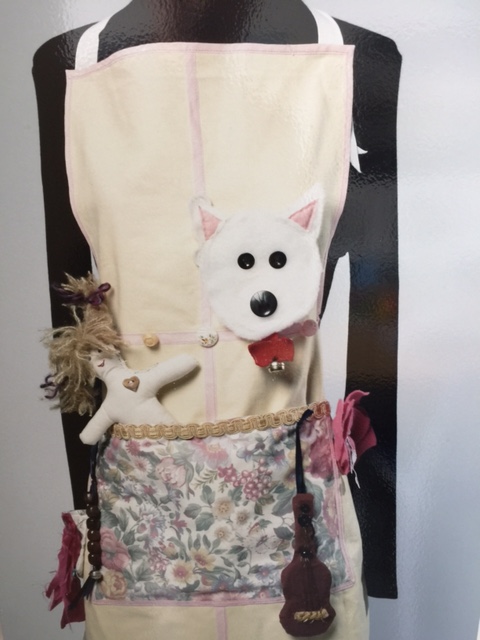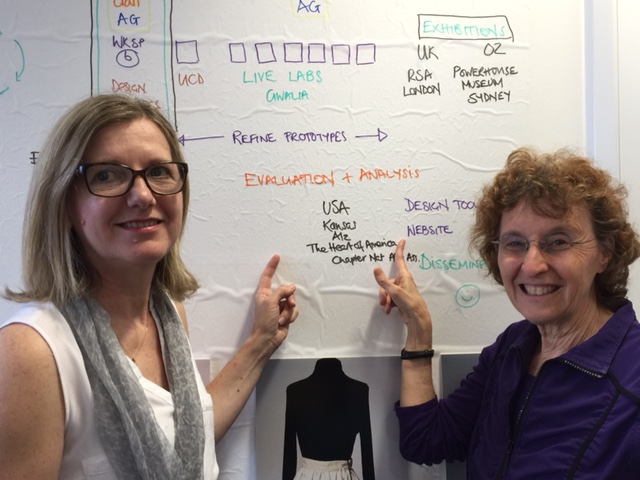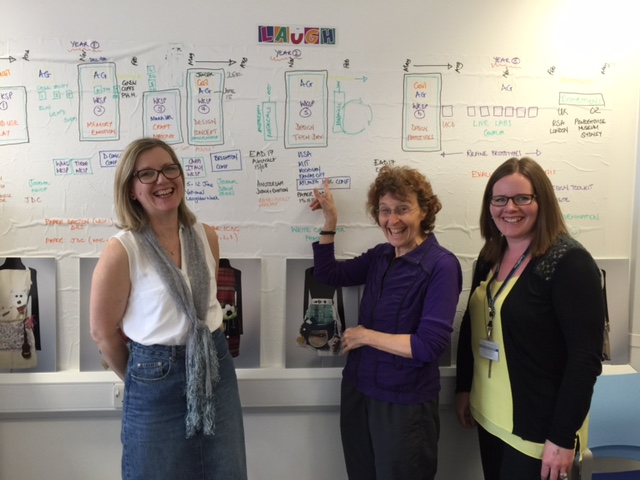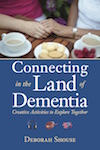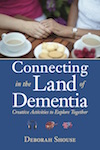Relationships
The Inside Story of Designing for Dementia
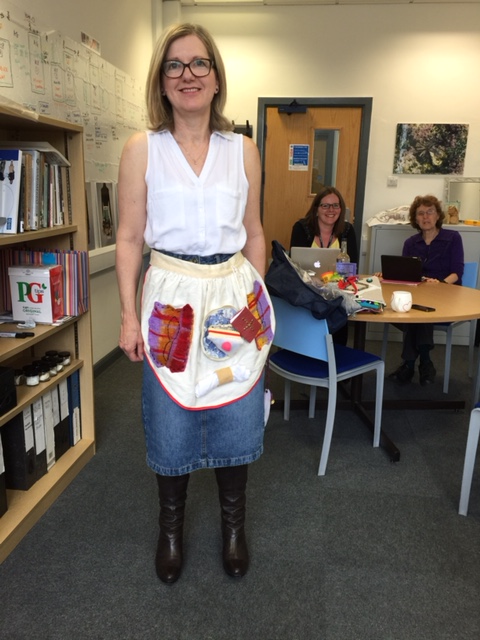 I love being around visionaries and Cathy Treadaway, PhD, is certainly one of them, changing the world one playful textile at a time. Cathy is the Professor of Creative Practice at the Cardiff School of Art and Design, Cardiff Metropolitan University, Wales, United Kingdom and she contributed to my upcoming book, Connecting in the land of Dementia: Creative Activities to Explore Together. I recently visited her at her university office in Cardiff, Wales, and wanted to share a few of her successes with you. In these stories, you’ll find intriguing ideas you can adapt to your own situation.
I love being around visionaries and Cathy Treadaway, PhD, is certainly one of them, changing the world one playful textile at a time. Cathy is the Professor of Creative Practice at the Cardiff School of Art and Design, Cardiff Metropolitan University, Wales, United Kingdom and she contributed to my upcoming book, Connecting in the land of Dementia: Creative Activities to Explore Together. I recently visited her at her university office in Cardiff, Wales, and wanted to share a few of her successes with you. In these stories, you’ll find intriguing ideas you can adapt to your own situation.
Walking in the Park Without Leaving Home
They often visited the park, walking the paths hand-in-hand, admiring the flowers and foliage, listening to the birdsong, enjoying the breeze and the fresh air. But as his dementia progressed, he could no longer navigate the park. Until Cathy Treadaway and her team created a tactile textile replica of the park, complete with interactive technology. When he pressed one of the tree icons, he heard the sound of the wind. He pressed another and was rewarded with birdsong. Now, they sit together and he traces the cloth paths and creates the sound effects as she talks about the outdoors and reminisces about their times together.
For Cathy Treadaway, that’s what her work is all about: enhancing life and keeping people connected. She specializes in creating individualized “playful objects,” interactive textiles that mirror the person’s interests and passions.
When Cathy asked about one person’s special interests, a favorite pet, a Westie, came up again and again. Cathy and her team set to work, building an apron that featured a soft white Westie that barked when pressed. The team velcroed the dog onto an apron. The woman living with dementia was fascinated by the apron and by the texture and sounds of the dog. So was her two-year-old great granddaughter. The apron gave her focus and pleasure and also offered conversation points for her multigenerational family.
Making Visits Meaningful
“Sometimes visiting someone is hard,” Cathy says. “These individualized blankets and aprons can make the experience easier and more fun for all parties.”
Cathy’s work is focused on compassionate design, using textiles as a means for retaining and building relationships. She often asks people this question: “If you could design something to strengthen the relationship between yourself and someone living with dementia, what would you design?”
For more information about Professor Treadaway and her work, please visit www.cathytreadaway.com and www.laughproject.info
Deborah Shouse is the author of Love in the Land of Dementia: Finding Hope in the Caregiver’s Journey.
COMING SOON: Connecting in the Land of Dementia: Creative Activities to Explore Together
Fulfilling the Bucket List, Trip by Trip
Our friends Elizabeth and Charlie Miller are a constant source of inspiration. Here is one of the many ways they embrace life.
Elizabeth and Charlie knew they had to instantly work on their travel bucket list. When they met and fell in love, Charlie had been living with dementia for four years. He had not traveled much, but he wanted to see the world with Elizabeth. He asked a friend to help him plan a romantic trip to San Francisco, where he proposed to her.
After she said, “Yes,” they combined their love of beaches and nature and began adventuring, going on driving trips, taking cruises, and sharing a multitude of experiences. When flying grew too complicated and stressful for Charlie, they focused on local day trips or short driving trips.
“I used to have to travel alone,” Elizabeth says. “Now, I travel with Charlie. He enjoys the trip in-the-moment. How wonderful to have all these shared experiences. Plus, it’s renewing to be outside of our routine.”
 Recently, Elizabeth and Charlie were driving around and Charlie said, “What was that long cruise last fall that had so many beautiful places?”
Recently, Elizabeth and Charlie were driving around and Charlie said, “What was that long cruise last fall that had so many beautiful places?”
Elizabeth stopped to think. “Hawaii,” she said.
“Hawaii,” Charlie said, his eyes bright. “Wasn’t that the best cruise ever?”
Elizabeth smiled and felt a deep sense of happiness and connection. “You are right. It was the best cruise ever.”
To make every trip “the best” here are a few flying travel tips from Elizabeth:
- Try for a non-stop flight at a time best for the person living with dementia.
- Call TSA in advance and arrange for assistance in getting through screening.
- Ask for a Pre-boarding pass to minimize the stress in boarding.
- Get a business-type card that says, “Thank you for your patience with my companion. He is living with dementia.” Share this information, as needed.
- Carry a travel packet that includes a letter from an MD, stating that your companion has dementia, and a medical power of attorney. Include doctors’ names and contact information as well as emergency contact information.
- Carry a bag of essentials: water, snacks, medications, a change of clothing, and activities.
- Be flexible, in the flow, and have fun!
Three Tips for Celebrating Mother’s Day When your Mom Has Dementia
“I don’t know what to do about Mother’s Day,” a friend recently told me. “I used to celebrate with my mother, but Mom doesn’t really recognize me now and the holiday won’t mean anything to her.”
My friend was not alone in her dilemma: according to the Shriver Report, ten million women either have Alzheimer’s or are caring for someone with it.
I’d faced the same issue with my mom as she sank into Alzheimer’s. But I’d decided that celebrating Mother’s Day was important for me and for my family, even if Mom didn’t truly understand what was going on.
Here are three tips I devised for reducing the sadness this holiday can trigger and for substituting a celebration of renewal and connection.
Feel Your Frustration and Grief
The happy-family-candy-and-flowers Mother’s Day television commercials seemed to shout at me: “Your mother is no longer who she used to be!” That was true and a spike of sorrow stabbed at me as I mourned my “normal mom.”
Celebration: Talk about your feelings with empathetic friends; feel your grief and the frustration. Explore ways to express yourself, perhaps through journaling, collaging, stomping about. Or cocoon and immerse yourself in mournful movies and music.
Activate Your Appreciations
My mother could not complete a sensible sentence, cook a simple meal or dress herself. She did not know my name or remember any of my accomplishments or stellar qualities.
Celebration: Notice and appreciate the good in your situation. Even though Mom didn’t remember my name, she also didn’t remember any of my shortcomings. She was no longer critical of my parenting skills and no longer shy to show affection. She had a dazzling smile, a whimsical giggle and an ability to look into my eyes. She was content with who I was, whoever I was. These were qualities to celebrate.
Celebrate Yourself and Your New Relationship
Since my mom could not care for herself, I learned to care for her. Our lives wove together and we became deeply connected, as I emerged from being just a daughter to becoming an advocate, spokeswoman and historian for my mother.
Celebration: On Mother’s Day, I stopped to celebrate myself, my flexibility, my sense of humor, my steadfast feelings of responsibility. I gave myself the gift of time and appreciation.
7 Ways to Concoct a Creative Celebration
Share favorite memories
Tell her favorite life stories
List her opinions, maxims and worries
Sing along to favorite family music
Muse over family photos
Serve up easy comfort foods
Share what you’ve learned from your journey with her
Deborah Shouse is the author of Love in the Land of Dementia: Finding Hope in the Caregiver’s Journey. COMING SOON: CONNECTING IN THE LAND OF DEMENTIA: CREATIVE ACTIVITIES TO EXPLORE TOGETHER
An Insider’s Tips for Finding Joy in the Journey
“Alzheimer’s can be a grind,” a caregiver recently told me.
That’s one reason I am constantly seeking those who see the creativity and potential in the journey. I look for inspiration and I found plenty in “Finding Joy in Alzheimer’s: New Hope for Caregivers,” a book by Marie Marley, PhD, and Daniel C. Potts, MD, FAAN. Both have a powerful personal story that they weave into the book, along with practical tips for care partners.
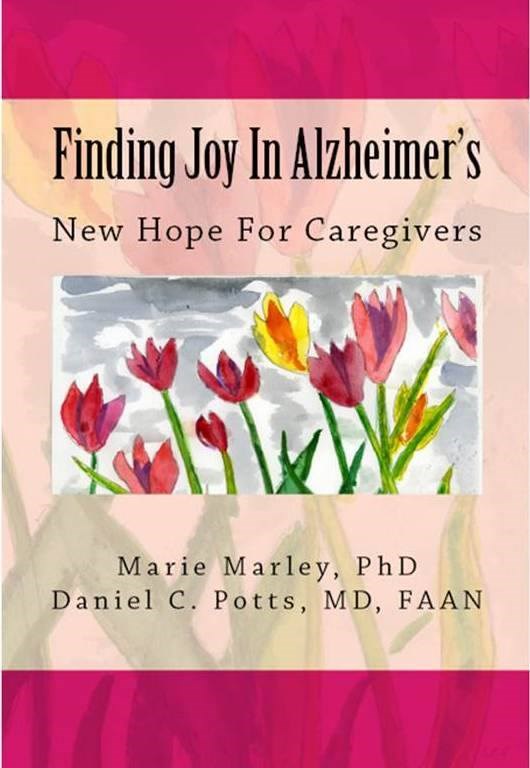 Three Ways to Encourage Your Own Love and Acceptance
Three Ways to Encourage Your Own Love and Acceptance
Here are a few excerpts from Daniel:
- Each interaction we have with another person presents an opportunity to share the hope that is within us.
- As care partners, we must identify and embrace the love present within each individual and we must enable the expression of that love, for personhood to be preserved and dignity promoted. We must also be fully cognizant of the love within ourselves.
- To come to terms with Alzheimer’s you must first let go of the expectation that you’ll find the previous person and instead embrace the new person– just as he is in the present. Since that person will continue changing as time goes by, one must constantly let go of the old person and accept the new one.
Three Ways to Improve Your Time Together
Marie offers these tips for staying connected:
- Use welcoming body language. Don’t sit with your arms crossed; sit with your palms turned upward. This posture says, “I’m receptive to you.”
- Speak slowly and in short, direct sentences, with only one idea to (in) each sentence.
- Laugh a lot. Arrive for your visit with a supply of simple jokes and funny stories.
For more information about Finding Joy in Alzheimer’s, visit ComeBackEarlyToday.com
Deborah Shouse is the author of Love in the Land of Dementia: Finding Hope in the Caregiver’s Journey.
One Simple Secret that Lights Up Lives
What if someone listened to you carefully enough to remember some of your favorite accomplishments? What if someone reminded you of those treasured moments as a way of celebrating you?
“When people can’t tell their own stories, their care partners can tell the stories for them,” says Tryn Rose Seley, expressive arts facilitator and author of 15 Minutes of Fame. “You can support significant events with affirmation cards, stating the achievement and thanking them.”
For example, for a client who is a retired teacher, Tryn prints on index cards, “You love children so much. You have taught many kindergarteners, and made a wonderful difference in their lives. Thank you.”
She puts these cards in prominent locations, so they can talk about them during the day.
When I interviewed Tryn for my upcoming book, I fell in love with this simple yet profound idea. I thought of my mother and the kinds of cards I could have created for her: “You served your country as a nurse in WWII. Thank you so much for that act of bravery.” “You painted wonderful pictures that you shared with family and friends. Thank you.”
I thought of friends who are living with dementia and the affirmations they would enjoy. I also thought of myself and my beloved partner Ron and the kinds of stories and affirmations that would make us glow.
Tryn reminded me how important meaningful activities, loving support, and affirmations are for people who are living with dementia, for their care partners, and for all of us.
***
Tryn Rose Seley is a musician, photographer, author, and expressive arts facilitator. She loves to interact with people of every age and does so on a regular basis. She leads musical experiences, shares her caregiver book, and writes every day, sometimes on the back of grocery receipts, other times on the world-wide-web. www.caregiverheart.com
Deborah Shouse is the author of Love in the Land of Dementia: Finding Hope in the Caregiver’s Journey.
Five A-HaHaHa’s for Adding More Laughter into your Life
When you laugh, you change, and when you change, the whole world changes. Dr. Madan Kataria, M.D., Founder, Laughter Yoga Movement
Have you ever found yourself surrounded by brilliant, compassionate, and creative people? For months, I interviewed more than 60 such luminaries, all of whom contributed to my new book, Connecting in the Land of Dementia: Creative Activities to Explore Together. The book features easy, meaningful, and fun activities for people living with dementia and their care partners.
Dr Madan Kataria, founder of the globally acclaimed Laughter Yoga movement, taught me how important and easy it is to consciously add laughter into the day.
“Do you know the Ha Ha chorus?” he asked, during our Skype session.
I had to answer, “No.”
He began singing, “Ha ha ha ha ha ha,” to the tune of Happy Birthday to You. I was instantly laughing, as was he.
Carmela Carlyle, who is a Dementia Care Specialist, Certified Laughter Yoga Teacher, and the creator of the training DVD, Laughter Yoga with Elders, offered simple tips for adding laughter into daily life, including “Ha ha ha-ing” at traffic lights and while cooking a meal together.
From these two luminaries, I learned the importance of consciously integrating laughter into daily life. Dr. Kataria explained that laughter improves blood circulation and increases the net amount of oxygen to body and brain, which makes us feel more healthy and energetic. Laughter also makes our immune system stronger. Plus, laughing with others builds a social bond and reduces feelings of isolation.
Carmela Carlyle says, “When we laugh, our jaws move, sending a message directly to the brain to release feel-good hormones. People living with dementia can bypass the intellect and go directly to the powerful medicine of laughter.”
To add more laughter into your life, visit www.laughteryoga.org
Madan Kataria, MD, is the founder of the Laughter Yoga Clubs movement, which started in 1995 in Mumbai, India. Dr. Kataria is an internationally acclaimed speaker and a corporate consultant for holistic health, stress management, team building, leadership, peak performance and communication skills. He is associated with a number of research projects to measure the benefits of laughter. www.laughteryoga.org
Carmela Carlyle, is a psychotherapist, Eldercare Specialist, Certified Laughter Yoga Teacher and Certified Integrative Yoga Therapist. Her DVD, Laughter Yoga with Older Adults: Joyful Chair Fitness, is used all over the world. www.carmelacarlyle.com
Deborah Shouse is the author of Love in the Land of Dementia: Finding Hope in the Caregiver’s Journey.
March Forth
It all began decades ago with the comic wrapped over the tempting pink square of Dubble Bubble. A sweet scent swept into me as I popped the gum into my mouth. While I chomped, the sugary juices swelling against my teeth, I read the riddle, neatly typed under the comic. “What is the only day of the year that tells you to go forward?” I had to twist the paper upside down to discover the answer: “March Fourth.” (March Forth!) Since that long ago moment, March Fourth has been one of my favorite days. Every year, I ponder, how am I going to march forth this year? How will I contribute to the world and how will I experience a meaningful and happy life?
This year I am learning a few creative lessons from several families of monkeys we met while visiting Costa Rica. These monkeys travel in groups, with a leader to show the way and a follower to make sure everyone gets safely on the tree-born trail. Often, the monkeys have to leap to the next limb, letting go before they’ve safely latched onto the next branch. They’re curious and if anything hints at being delicious or interesting, they scramble down to investigate. And they are not shy about sounding their voices.
Here’s a small monkeying around video and here’s a few of the ways I’m inspired to March Forth.
A delicious way to March Forth
I’m following the trail of my own curiosity.
I’m helping others find a path.
I’m letting go of the familiar when I can.
I’m making the most of what is right in front of me.
I’d love to hear about the people or animals that inspire you and I’m interested in any ways you’re going to March Forth.
Deborah Shouse is the author of Love in the Land of Dementia: Finding Hope in the Caregiver’s Journey.
Expanding My Definition of Love
Love comes in so many magical guises. My journey with people who have Alzheimer’s has expanded and deepened my understanding of love. Here are some insights from others.
My friend Vicki always inspires and teaches me. She has early onset Alzheimer’s and her outlook is an embodiment of grace and spirit. She writes: “I have lost both friends and family members since I have dementia. Some people are just so uncomfortable that they just cannot bear to see me go down hill. I have lost a very good friend who just can’t seem to handle it. I know that these people love me but they do not have the emotional fortitude to see the daily loss. You will find out who really loves you when you get dementia because these are the people who will be there for you when you need them.” — Vicki Stoecklin, Kansas City, Mo, retired designer
The True Meaning of Unconditional Love
Linda Fisher is a tireless advocate and a caring person. Her words really move me. “Caring for my husband Jim taught me the true meaning of unconditional love. I became fiercely protective of him and learned to love him ‘as is’ without looking back on the man he had been or forward to the man he would become. My love for him continued to grow throughout the ten years of his dementia, as he became dependent on me to be his advocate in all aspects.” — Linda Fisher, Sedalia, Mo, retired office manager, Central Missouri Electric Coop http://earlyonset.blogspot.com Early Onset Alzheimer’s: My Recollections, Our Memories (2012)
The Full Range of Emotions
Kelly Sheet, founder of the SpunkyCaregiver, offered these deep insights: “I have learned that love transcends any words and appearances. When someone has dementia, love is shared through energy and feeling. You can be vulnerable with people who are living with dementia. And it is a relief to be so open. Day-to-day we are expending energy to protect ourselves from saying too much or too little or the wrong thing. The great gift of loving people with dementia is that you can let go of those ideas, experiment with what a full range of emotions actually feels like. Without being judged, you can laugh spontaneously at some goofy moment, dance with abandon or hold hands with a stranger. Loving people with dementia helps me to feel alive. The hundreds of seniors I have known over the years have really taught me how to love more freely.” — Kelly Sheets, Founder, Sisters, Or, www.TheSpunkyCaregiver.com,
Every person teaches us more about love.
Deborah is the author of Love in the Land of Dementia: Finding Hope in the Caregiver’s Journey.
Learning about Love through the Dementia Journey
This month, I’ve been asking myself and others, What have you learned about love from your dementia journey? Here are some of the profound answers:
I learned that it is redefined. I loved my mother as my parent, and then learned to love her as a child. And I would not trade that experience for anything. Pamela J. Van Ahn, Executive Director at Caring Together in Hope, Inc., Atlanta, GA
I have learned that love remains, even as memory fails. Long after your name is forgotten, there are still frequent glimpses of recognition that are very meaningful. The Alzheimer’s patient does not become “a different person”. They are much more “still there” than easily meets the eye. With Alzheimer’s disease, things that have emotional context are remembered the longest, and love is a strong emotion. Max Wallack, research intern in the Molecular Psychiatry in Aging Laboratory at Boston University School of Medicine, Boston MA.
I have learned so many lessons regarding love through my mothers journey with dementia. Here are just a couple of them. There are multiple levels of unconditional love. Each one is more precious and runs deeper then the next. “Letting Go” of our need to control is one of the most loving things we can do for a person with dementia and ourselves. Allowing a person with dementia to be in a loving respectful relationship, even if it might be with someone unexpected, is a gift to all and does not mean they love us less. Love runs much deeper than a name. We need to stop quizzing a person with dementia to check if they know and love us. A name has nothing to do with the bond and connection between two souls. Lori La Bey, Founder of Alzheimer’s Speaks , St. Paul, Minnesota, www.AlzheimersSpeaks.com
Deborah is the author of Love in the Land of Dementia: Finding Hope in the Caregiver’s Journey.
Appreciating the Power of Love
“How long have you been together?” the younger couple asked Ron and me.
“Twenty-two years,” we answered.
“Wow!” they said. They’d been in love for seven months and our decades-long romance must have seemed exotic and slightly unbelievable.
“What are the secrets of a good relationship?” they asked. “Please share your wisdom.”
First, Ron and I basked in the idea that two people believed we possessed actual wisdom! Then we shared our insights.
How We Learned about Love
Our insights came from growing as individuals and as a couple during our wonderful long relationship and from earlier relationships that had helped us become our true selves. We also learned from watching our parents maintain their relationships in the face of dementia.
When Ron’s father Frank was in a memory care unit, Ron’s mom Mollie told her husband, “I love you so much.” Frank replied, “Not as much as I love you!.” Those were some of Frank’s last words and that sentence stayed with Mollie through and beyond her grieving.
During my growing up years, my father was circumspect in declaring his love for Mom. But when she slipped into dementia, Dad showed me what a true romantic he was. He treated her like he was courting her; he showered Mom with compliments and kisses and frequently he expressed his love for her. Even when she could no longer talk, she still enjoyed her favorite foods—he faithfully fed her sliced strawberries and chocolate candies.
Love Me Tender, Make Me Laugh, Always Have My Back
My parents were my role models and I also learn an enormous amount from the couples I interview every week for the love story column I write for the Kansas City Star Magazine. Here are some of the qualities people most love about their life partners and spouses.
Loves me just as I am
Takes care of me/Always has my back
Makes me laugh
Shares my values/ Complements me
Works hard/ Is honest and reliable
Always puts other people first/ Always puts me first
Inspires me to be better/ Appreciates me
Love Lights the Way
Some months ago, Oprah had author, visionary and cultural mid-wife Jean Houston on her TV show. “What do you wish people knew?” Oprah asked Jean.
“I wish people knew how powerful love is,” Jean answered.
That was one of the grandest lessons from my journey with my mom through her dementia: the power of love. Her love lasted all her life, far beyond her memory of things and people. Her love was a spark that lit up her life and mine.
